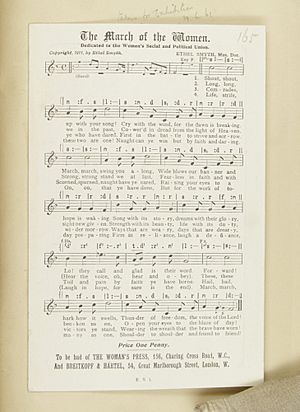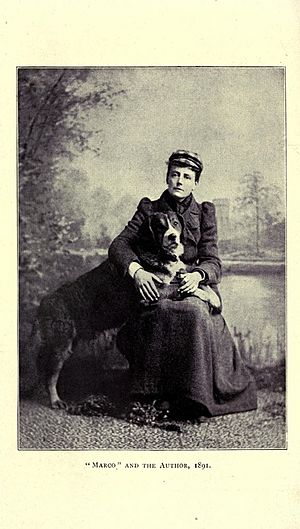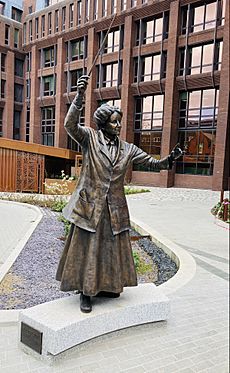Ethel Smyth facts for kids
Quick facts for kids
Ethel Smyth
|
|
|---|---|
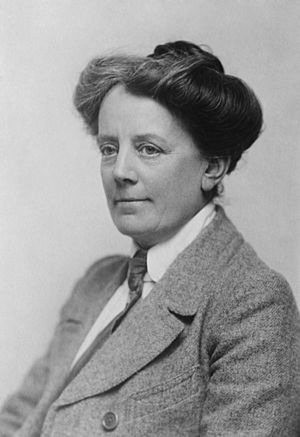
Ethel Smyth in 1922
|
|
| Born |
Ethel Mary Smyth
22 April 1858 Sidcup, England
|
| Died | 8 May 1944 (aged 86) Woking, England
|
| Nationality | British |
| Alma mater | Leipzig Conservatory |
| Occupation | Composer and suffragette |
Dame Ethel Mary Smyth (born April 22, 1858 – died May 8, 1944) was a famous English composer. She also played a big part in the women's suffrage movement, which fought for women's right to vote.
Ethel Smyth wrote many different kinds of music. This included songs, piano pieces, chamber music (for small groups of instruments), orchestral works, choir music, and operas. An opera is a play where the story is told mostly through singing.
Sometimes, people didn't take her music as seriously because she was a woman. But she was still very talented. She was the first female composer to be given a special honor called a damehood. This was a big achievement for her and for women in music.
Contents
Ethel Smyth's Early Life
Ethel Smyth was the fourth of eight children in her family. Her youngest brother, Robert, became a high-ranking officer in the British Army. She was also the aunt of Lieutenant General Sir Ralph Eastwood.
Ethel was born in Sidcup, a town in England. Even though she was born on April 22, her family always celebrated her birthday on April 23. This was because it was the same day as William Shakespeare's birthday, which they thought was fun!
Her father, John Hall Smyth, was a major general in the army. He did not want Ethel to become a musician. But Ethel was determined to follow her dream. She lived in Frimhurst for many years before moving to Hook Heath.
Her Amazing Music Career
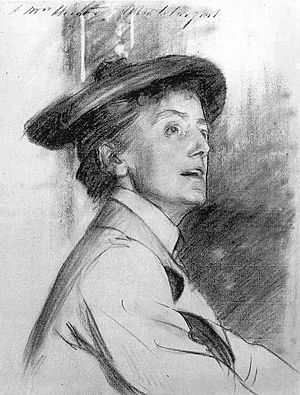
When Ethel was 17, she started studying music with Alexander Ewing. He showed her the exciting music of famous composers like Richard Wagner and Hector Berlioz.
After a big disagreement with her father, Ethel was allowed to study music at the Leipzig Conservatory in Germany. She learned about composing music there. However, she left after a year because she felt the teaching wasn't good enough. She continued her studies privately with Heinrich von Herzogenberg.
While in Leipzig, she met other famous composers like Antonín Dvořák, Edvard Grieg, and Pyotr Ilyich Tchaikovsky. Through Herzogenberg, she also met Clara Schumann and Johannes Brahms. When she returned to England, she became good friends with Arthur Sullivan, who encouraged her music.
Ethel Smyth wrote many important musical pieces. These include her Concerto for Violin, Horn and Orchestra, and her Mass in D. Her opera called The Wreckers is considered one of the most important English operas from its time. It was even performed at the famous Glyndebourne Festival Opera in 2022.
Another of her operas, Der Wald, was performed in New York in 1903. For over 100 years, it was the only opera by a woman composer ever shown at the Metropolitan Opera!
In 1928, the BBC (a big broadcasting company) played two concerts of Ethel Smyth's music. This celebrated her long music career. Her last major work was a long vocal symphony called The Prison, which was first performed in 1931.
After her music career, Ethel found a new passion: writing! Between 1919 and 1940, she published ten very successful books. Most of these books were about her own life.
Fighting for Women's Rights
In 1910, Ethel Smyth joined the Women's Social and Political Union (WSPU). This group worked hard to get women the right to vote, which was called women's suffrage. Ethel even stopped composing music for two years to focus on this important cause.
She often went with Emmeline Pankhurst, who was a powerful leader of the WSPU. Ethel's song, "The March of the Women" (written in 1911), became the official song for the suffragette movement. Suffragettes were women who fought for the right to vote.
Ethel Smyth even taught Emmeline Pankhurst how to throw stones in 1912. This was part of their protest to get attention for their cause. Emmeline Pankhurst asked WSPU members to break windows of politicians' houses who were against women voting. Ethel was one of the 109 women who joined in. She chose to target the home of Lewis Harcourt, a politician who had made a rude comment about women.
Ethel was arrested and spent two months in Holloway Prison. When her friend, Thomas Beecham, visited her there, he saw other suffragettes marching and singing. Ethel was leaning out of her window, conducting their song with a toothbrush!
In her book, Female Pipings in Eden, Ethel wrote that being in prison was like being "in good company." She felt united with other women, both old and young, rich and poor, who were all fighting for the same cause. She was released early from prison.
Ethel disagreed with Emmeline and her daughter Christabel Pankhurst when they supported the war effort in 1914. Their friendship ended in 1925. However, Ethel still conducted the Metropolitan Police Band in 1930 when a statue of Emmeline Pankhurst was revealed in London.
Her Life and Interests
Ethel Smyth had many close friendships throughout her life. She was good friends with the writer Virginia Woolf, and they became very close.
Ethel loved sports her whole life. When she was young, she enjoyed horse-riding and playing tennis. She was also a very keen golfer and was a member of the Woking Golf Club. After she passed away, her ashes were scattered in the woods near the golf club, just as she had wished. Her brother Bob helped with this.
In 1922, Ethel Smyth was given the honor of being a Dame Commander of the Order of the British Empire (DBE). This made her the first female composer to receive such a high award. She also received special degrees in music from Durham and Oxford Universities.
Ethel Smyth passed away in Woking in 1944 when she was 86 years old.
How She is Remembered
Ethel Smyth appeared as a character named Edith Staines in some books by E. F. Benson. She was also a model for a fictional character named Dame Hilda Tablet in radio plays from the 1950s.
In 1974, an actress named Maureen Pryor played Ethel Smyth in a BBC television film called Shoulder to Shoulder.
A famous artwork called The Dinner Party by Judy Chicago includes a special place setting for Ethel Smyth. This artwork celebrates important women throughout history.
Since 2018, an actress and singer named Lucy Stevens has played Ethel Smyth on stage in Britain.
In March 2022, a large statue of Ethel Smyth conducting was revealed in Woking. This statue was created by Christine Charlesworth. It was a way to honor Ethel Smyth and her amazing contributions to music and women's rights.
Her Writings
|
|
Recordings of Her Music
- The Boatswain's Mate. Nadine Benjamin, Rebecca Louise Dale, Edward Lee, Ted Schmitz, Jeremy Huw Williams, Simon Wilding, Mark Nathan, Lontano Ensemble, c. Odaline de la Martinez. Retrospect Opera RO001 (two CDs).
- Cello Sonata in C minor (1880): Friedemann Kupsa cello, Anna Silova piano; Lieder und Balladen, Opp. 3 & 4, Three Moods of the Sea (1913): Maarten Koningsberger baritone, Kelvin Grout piano. TRO-CD 01417.
- Cello Sonata in A minor (1887): Lionel Handy cello, Jennifer Hughes piano: Lyrita SRCD412. (2023)
- Complete Piano Works. Liana Șerbescu. CPO 999 327-2.
- Concerto for Violin, Horn and Orchestra. BBC Philharmonic, c. Odaline de la Martinez. Chandos Chan 9449.
- Double Concerto in A for violin, horn and piano (1926): Renate Eggebrecht violin, Franz Draxinger horn, Céline Dutilly piano; Four Songs for mezzo-soprano and chamber ensemble (1907): Melinda Paulsen mezzo, Ethel Smyth ensemble; Three songs for mezzo-soprano and piano (1913): Melinda Paulsen mezzo, Angela Gassenhuber piano. TRO-CD 01405.
- Fete Galante: A Dance Dream Charmian Bedford (soprano), Carolyn Dobbin (mezzo soprano), Mark Milhofer (tenor), Alessandro Fisher (tenor), Felix Kemp (baritone), Simon Wallfisch (baritone), Lontano Ensemble/Odaline de la Martinez. Retrospect Opera RO007.
- Mass in D, March of the Women, Scene from The Boatswain's Mate. Eiddwen Harrhy, The Plymouth Music Series, Philip Brunelle. Virgin Classics VC 7 91188-2.
- The Prison: Sarah Brailey, Dashon Burton, soloists; Experiential Orchestra and Chorus; James Blachly, Conductor. Steven Fox, Chorus Master, Blanton Alspaugh and Soundmirror, producer. Chandos Records (2020).
- Serenade in D major. BBC Philharmonic, c. Odaline de la Martinez. Chandos Chan 9449.
- String Quartet in C minor. Maier Quartet. DB Productions, DBCD197.
- String Quartet in E minor and String Quintet op. 1 in E Major. Mannheimer Streichquartett and Joachim Griesheimer. CPO 999 352-2.
- Suite for String Orchestra (1920), Südwestdeutsches Kammerorchester Pforzheim, conducted by Douglas Bostock. CPO 555 457-2 (2022).
- Violin Sonata in A minor, Op. 7, Cello Sonata in A minor, Op. 5, String Quintet in E major, Op. 1, String Quartet in E minor (1912): Renate Eggebrecht, violin, Friedemann Kupsa cello, Céline Dutilly piano, Fanny Mendelssohn Quartet. TRO-CD 01403 (two CDs).
- Violin Sonata in A minor, Op. 7: Annette-Barbara Vogel, violin, Durval Cesetti, piano. Toccata TOCN0013 (2021).
- The Wreckers. Anne-Marie Owens, Justin Lavender, Peter Sidhom, David Wilson-Johnson, Judith Howarth, Anthony Roden, Brian Bannatyne-Scott, Annemarie Sand. Huddersfield Choral Society, BBC Philharmonic, c. Odaline de la Martinez. Conifer Classics. (Re-released by Retrospect Opera, RO004).
See also
 In Spanish: Ethel Smyth para niños
In Spanish: Ethel Smyth para niños
- Norah Smyth – Ethel Smyth's niece and also a notable suffragette
- List of suffragists and suffragettes
 | Aurelia Browder |
 | Nannie Helen Burroughs |
 | Michelle Alexander |


